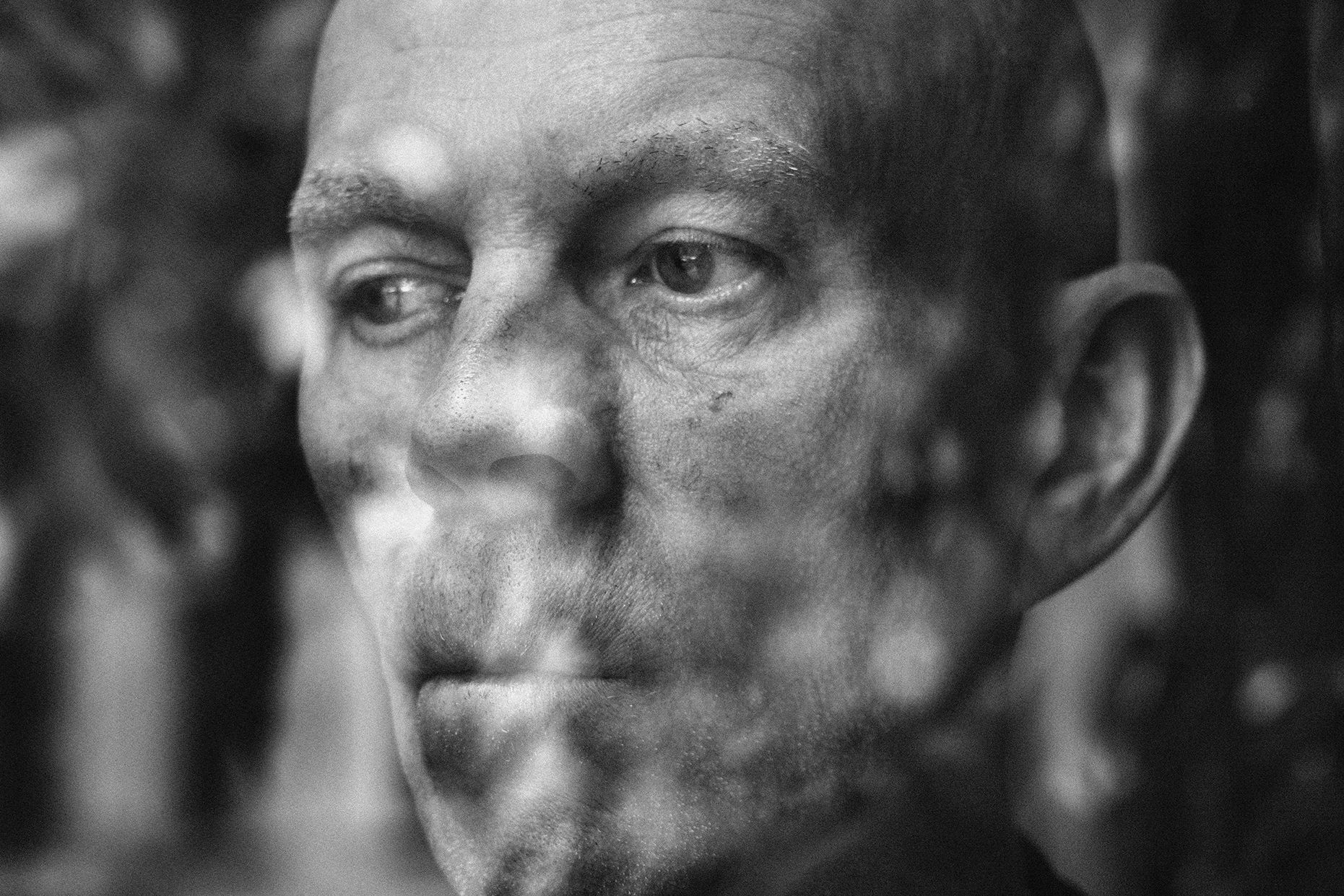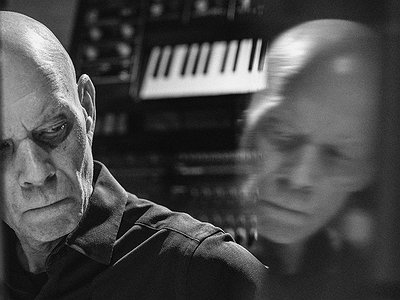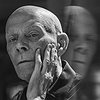Name: Vince Clarke
Nationality: British
Occupation: Producer, songwriter, remixer
Current Release: Vince Clarke's Songs of Silence is out November 17th 2023 via Mute.
About the genesis of the album title Songs of Silence: “It's quite an obvious title to me, really. All of the track titles and the album titles came after I'd finished the music. Once I learned that the record company were interested in actually releasing it, I had to come up with something. And there's no singing. So it's actually as simple as that!”
For more insights by artists on the mute roster or who have released with the label, check out our Plastikman interview, A Certain Ratio interview, Daniel Avery interview, Chris Liebing interview, Gareth Sager of The Pop Group interview, JakoJako interview, Terence Fixmer interview, Pole interview, Cosey Fanni Tutti of Throbbing Gristle interview, Yann Tiersen interview, Alessandro Cortini interview, Barry Adamson interview, hackedepicciotto interview, Moby interview, Mika Vainio of Pan Sonic interview, and Jarboe of SWANS interview.
If you enjoyed this Vince Clarke interview and would like to stay up to date with his music, visit his official homepage.
Over the course of his career, Vince Clarke has collaborated with and remixed a wide range of artists, including Jean-Michel Jarre, Paul Hartnoll of Orbital, and Martyn Ware of Heaven 17.
[Read our Jean-Michel Jarre interview]
[Read our Orbital interview]
[Read our Martyn Ware interview]
Why did you chose to limit yourself for Songs of Silence?
I think I started making tracks, probably a couple of months after lockdown in New York. There wasn't much for me to be doing. So first, I worked on some Erasure stuff. And then after I'd finished up, I thought, let's try something else.
I've had a small Eurorack system for quite a while. But I've never really looked into it properly, or worked out how to use it and make use of its potential. So I just started getting obsessed with YouTube tutorial videos on Eurorack modules, and that's really what kicked off the project.
I started experimenting with all of the examples that they would give you in these tutorials on a particular module. It was really just an exercise. I wasn't planning to make a record. I was just learning something new.
Was it maybe also a bit about stepping outside of your routine and going into something unexplored?
I think so. I mean, I certainly needed something to do. Everybody did, we were all bored shitless you know. I've got a studio in Brooklyn and before COVID, I would spend hours in it when I was down there. Music is just part of my life. But I don't think that making making music is ever mundane for me. I mean, I love it, and I've got the best job in the world, I really do.
It's like being in a toy shop. Especially when you're not working to a particular format, like a pop song. If you're not working with the choruses and verses and bridges, or that kind of traditional arrangement, then the sky's the limit. You can do what you like, and there's a real joy in that.
I like the process more than I do the release.
That said, the individual pieces of the album do combine into a coherent whole.
Yes, but that's because all the tracks started in the same way. They all started with one single sound, one single drum. I did around 15 or 18 tracks, but they all started with one sound.
Only then would I start introducing new elements into a track, possibly a little bit of a sample somewhere along the line. On one of the tracks, “Blackleg,” I had this recording of an old folk song from the 30s or 40s, I think, and incorporated that. So that lends it a different feeling.
But there's a connection between all the tracks just because of the nature of the arrangements.
Vince Clarke Interview Image by Eugene Richards
Why did you include the limitation of staying within one root note? Out of all the limitations that was the most interesting to me.
I always wondered how people managed to make this type of music, to sustain interest. So really, the challenge was to introduce elements at various stages throughout the track, to offer sounds and to develop them so that I was still interested in hearing them.
If I had gone back and started introducing chord changes, then I would be bringing things back to what I had done already.
So are these pieces edited down from longer sessions?
They're actually extended!
Ha!
They were all three minutes long. But then, I don't know why, I just got drawn into that whole process and I extended most of them.
Actually the tracks with the sequences were the hardest to do because it was really tempting to introduce claps and snares. But I didn't want to do that.
You're always trying to do something different every time that you make a new record or try to discover something new. So I managed to avoid the pitfall of suddenly turning it into a dance track.
If you compare the challenges of the new album and the challenges of recording something like Chorus where you didn't work with chords but only monophonic synthesizers - which was the the more challenging project would you say?
Probably Chorus was a little more challenging. But even that one was a real joy to do. Just because we had these little rules doesn't make any difference to the pleasure I got out doing it. Also, there's a certain amount of satisfaction when you don't just add a piano but instead try and achieve the sound with entirely different means.
I'm not saying the new album was easy to do because you really need to listen to the same thing over and over and over again for hours and hours and hours. Eventually, even the cat left the studio and it was just me.
But I didn't mind that as it was a bit of escapism for me. My personal life situation at home wasn't great. And so it really took me out of all of that, you know - doing this.
One thing you mentioned quite often is that you love to be surprised by your machines. But if you're spending so much time with the modules as part of a project like Songs of Silence, how can you keep up the surprise?
Most of my modular synthesisers work in the same way, the same principle is basically a VCO, VCF and VCA modulated by an envelope. But with these new Eurorack modules, there are so many ways to modulate those sounds. So many, you know, it's crazy. And it would be very difficult for me to get to know all of those modules that well.
Over time, I watched lots and lots of tutorials. Even now, I didn't really even scrape the bottom of the barrel. There's tonnes more stuff. I still don't really fully understand the ones I have here!
With old modular stuff, say, a Roland 700 system or a Moog system, they're basically, mechanically, physically, all the same. The great thing about all modular synthesisers is that you can plug anything into anything. Yes, there are inputs and outputs, but it doesn't really matter. You can't really fuck up and sometimes you'll come up with something that's happening.
So the complexity of the system, even in a relatively simple state, already sort of precludes you from ever solving the mystery behind it in a way?
Yeah, absolutely. It's not even a big system. But some of the modules are super complex, and there might be several tutorials, each going from different levels of what you can do with this particular module.
At Superbooth this year, they extended the event by one day and they had an event for children. So they had different tryouts where children could play with drum machines or just connect wires. It's such a playful and never ending idea of working with sound.
Yes, it is. And it's good to catch them early because once they turn 16 or 18, they can't be bothered anymore. My son is just not at all interested in anything analogue: why would I do that rather than doing it on my computer?
My son's school, his music department, wanted me to do a short talk and a short tour of my studio befor COVID happened. We took a camera around the studio and showed the kids various bits and bobs. But they were already too old for it. Why would they care about a 1978 Arp 2500? It means nothing to them. They have all these wonderful sounds on the soft synthesisers on their phone!
[Read our feature on the Arp 2500]
Still, there is a stronger connection to physical objects we have as physical beings.
There is something wonderful about the physicality of a modular synth. Using two hands rather than one hand for the mouse. With books, it's the same, you hold the book in two hands.
And then, there's the unpredictability of everything as well. There are very few modules that have a memory. So no matter what you do, invariably you're going to come up with something slightly different from what you did before. Which is why I'm very jealous and on the other side I'm astounded when people take this stuff on the road. I would honestly be panicking thinking - well that sounds weird, how am I gonna recreate that?
Vince Clarke Interview Image by Eugene Richards
Tell me a bit about the role that sound has played for your development as an artist.
Before Depeche Mode, when the second Human League album came out, there were suddenly these sounds I'd never heard before. They weren't using drum kits, everything was synthesised, it was completely unique.
I mean, punk rock wasn't a particularly unique story with regards to sound - it was just the same old thing really, just played a bit faster and with that attitude. Which is why I don't like it. But when suddenly, these early synthesiser bands started, they had a sound I'd never heard before. So it wasn't a recreation of anything. And that's what really drew me in.
I love the idea of making drum sounds without the drummer, for instance, it's so much better to make drums out of your drum machine. You don't necessarily have to go down the traditional route or the traditional sounds for something to be cool and groovy. You can take anything through a lot of sampling, something that really isn't percussive or drumlike, and turn it into a groove, which I think is amazing.
When we change from a major key to a minor key, there is an emotional change. What do you think changes when we do that with sound? Like just a small filter change? Is that comparable? Is it different?
No, that's different. When you start messing about with chords, you're using a different part of your brain.
With sound, for me anyway, let's say, you have a painting and all there is is red. And in the corner, someone's taken a paintbrush and just put a splodge of yellow. And to me, that the kind of chage we're talking about here. It's that little yellow splodge and then the painting kind of makes sense and which keeps your interest over a period of time.
Do you have synaesthesia?
Yes, I'm looking at it now actually. It's funny why do you say that?
Because Songs of Silence was made with a very limited sound palette and the cover is all black and white. And I would say that the cover of the album looks like the sound palette to me. And I always thought with the covers Erasure had there was always a visual connection to the music.
Well, I think that the artwork for Erasure has always been quite “up” and uplifting. Perhaps a little whimsical as well. That's why I went down this other route for the artwork for this particular record, when it's completely the opposite.
I've got a little bit of tinnitus in one ear. And I live in New York. There's never any silence here. Ever. We have very good windows, but still, there's never any silence. So the thing that really breaks my head the most is when I suddenly don't hear anything at all.
We used to have a place in Maine which is in the countryside. When we stay there I was always astounded at how quiet it was. And that would really get my brain working. It will feel very, very strange and it will take a few days to get used to.
I'd love to try and visit one of those anechoic chambers. I'm sure it would freak me out. It's supposed to be horrific but I'd love to experience it.
What kind of sounds do you feel you're drawn to?
I'm drawn to electronic music, and I have been for years and years and years. It's not that we haven't used outside sources. But we've only ever really used them as tiny highlights or events. They've never been the mainstay for the song.
Maybe to some people or maybe to kids, they'll listen to a record like this and they'll go: oh well, it's just more synthesisers. Or they may feel they've heard these sound before. But personally, I'm still fascinated by it. I still love the fact that it isn't real at all. I love the unrealness of it.
It's a landscape that's constantly changing. I guess with the violin, you can put it through certain effects. But this stuff is just endless.






